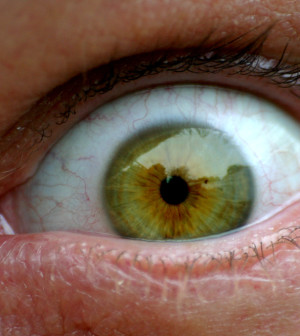- 10 Strategies to Overcome Insomnia
- Could Artificial Sweeteners Be Aging the Brain Faster?
- Techniques for Soothing Your Nervous System
- Does the Water in Your House Smell Funny? Here’s Why
- Can a Daily Dose of Apple Cider Vinegar Actually Aid Weight Loss?
- 6 Health Beverages That Can Actually Spike Your Blood Sugar
- Treatment Options for Social Anxiety Disorder
- Understanding the Connection Between Anxiety and Depression
- How Daily Prunes Can Influence Cholesterol and Inflammation
- When to Take B12 for Better Absorption and Energy
Sleep Apnea May Raise Women’s Heart Risk, But Not Men’s

The nighttime breathing disturbance known as sleep apnea can boost a woman’s risk for heart problems and even death, but there was no such effect for men, a new study finds.
The finding “highlights the importance of sleep apnea screening and treatment for women, a group who often are not routinely screened for sleep apnea,” study co-author Dr. Susan Redline, a sleep specialist at Brigham and Women’s Hospital in Boston, said in a hospital news release.
The study involved more than 1,600 people, average age 63, who did not have heart disease at the start of the study. All were tracked for an average of nearly 14 years.
During that time, 46 percent of the men and 32 percent of the women either developed heart problems or died.
The study wasn’t designed to prove cause and effect. However, Redline’s group found that women with moderate to severe sleep apnea had more than a 30 percent higher risk of heart problems than women without sleep apnea. The study found no significant link between sleep apnea and heart problems in men.
The researchers also found that, compared to women without sleep apnea, women with the disorder had higher blood levels of troponin, a chemical signal of early heart damage.
The findings suggest that older women may be at greater risk for sleep apnea-related heart disease than men, Redline’s team concluded.
Two experts agreed that the findings are a wake-up call to spot and treat sleep apnea in women.
“Obstructive sleep apnea is a common sleep disorder characterized by heavy snoring, airway blockage during sleep and daytime sleepiness,” noted Dr. Harly Greenberg, medical director of the North Shore LIJ Sleep Disorders Center in Great Neck, N.Y.
“While sleep apnea is often thought of as a disease most common in men, these results highlight the importance of recognizing sleep apnea symptoms in women, particularly in those who are post-menopause, in whom the incidence of sleep apnea increases,” he said.
“Women who report symptoms of sleep apnea that include snoring, gasping as night, bed partner’s observation of ‘stopping breathing,’ morning headaches, non-refreshing sleep or daytime sleepiness should undergo sleep testing for assessment of possible sleep apnea,” Greenberg advised.
He said that “treatments for sleep apnea include weight loss, avoidance of alcohol in the evening, continuous positive airway pressure therapy (CPAP) and dental appliances.”
Dr. Sean Pinney is director of Advanced Heart Failure and Cardiac Transplant Program at the Mount Sinai Medical Center in New York City. He believes the new findings should “help us understand the mechanisms underlying heart failure.” The fact that women’s hearts seem more affected by sleep apnea is “very compelling,” Pinney added.
The study was published this month in the journal Circulation.
More information
The U.S. National Heart, Lung, and Blood Institute has more about sleep apnea.
Source: HealthDay
Copyright © 2026 HealthDay. All rights reserved.










